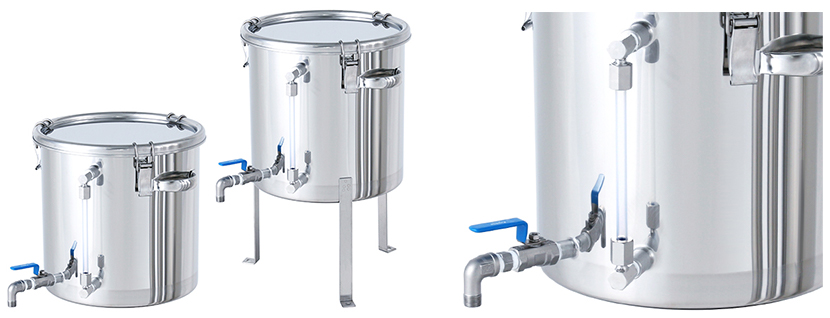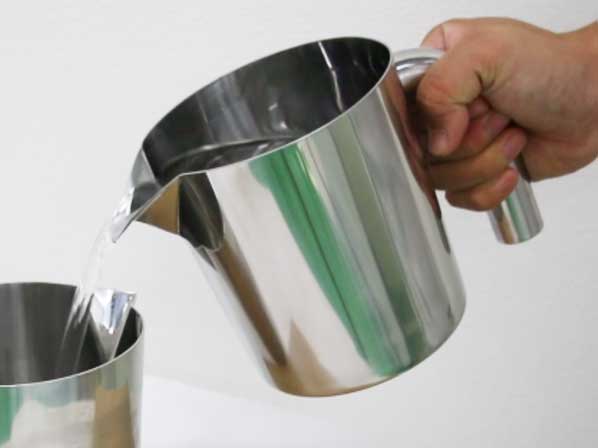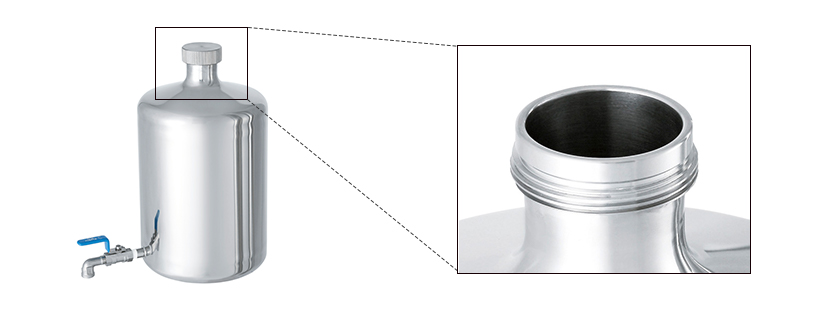
Recently, demand for alcohol and sodium hypochlorite has been increasing.
I think your company is doing the following.
- We purchased disinfectant solutions to protect the sanitary environment in the company.
- Disinfectants are prepared and distributed to ensure the health of employees.
Buy large-capacity items such as 18-liter cans and bag-in-boxes and divide them into small portions. Also, depending on the type of disinfectant, you may need to dilute it, but “Stainless steel products suitable for subdividing” is recommended in this case.
In this column, in addition to “What about the compatibility of antiseptic solution and stainless steel?” we will introduce 2 stainless steel products that are best suited to subdivide disinfectants.
1. Is it okay to store the disinfectant in a stainless steel container?
First, let’s check the compatibility of antiseptic solution and stainless container. In this case, I would like to focus on two things: (1) compatibility between the main body (Stainless) and the disinfectant, and (2) compatibility between the packing and the disinfectant.
The following sections describe the compatibility of commonly used alcohols with sodium hypochlorite solution.
Compatibility between antiseptic solution and stainless steel
Alcohol (Ethanol): No problem
Sodium hypochlorite solution: Attention should be paid to the concentration.
Alcohol does not affect stainless steel. Therefore, not only can alcohol be stored in stainless steel containers, but also the stainless steel containers themselves can be disinfected with alcohol.
On the other hand, when sodium hypochlorite solution is handled, attention should be paid to its concentration.
According to research 1 by Kitasato Environmental Science Center and others, when SUS 304 was dipped in sodium hypochlorite solution of 0.1% concentration, rust occurred on a part of the next day. Therefore, it is not suitable to put sodium hypochlorite solution of about 5% concentration (Highter, etc.) on the market as it is.

On the other hand, Research 2 of Yamagata University found that when SUS 304 was immersed in 0.05% sodium hypochlorite solution for 72 hours, there was no particular effect. In disinfecting applications such as wiping, it is common to use the product at a concentration of 0.05%.
Therefore, stainless steel containers are not suitable for the storage of sodium hypochlorite solution. However, there will be no problem if you use a stainless steel beaker or a ladle which is convenient for moving liquid. In that case, it is important not to neglect cleaning.
Please store alcohol safely according to the rules of each country.
Compatibility between disinfectant and packing
The standard material of the packing used in our company containers is silicon. Let’s check the compatibility of silicone and disinfectant.
Alcohol (Ethanol): No problem
Sodium hypochlorite solution: No problem
Neither disinfectant has any effect on silicon. In addition, PTFE (fluororesin) can be used for other materials without any problem.
Sodium hypochlorite solution in particular has a strong oxidizing effect, and the degree of effect varies depending on the concentration.
2. Two stainless steel products ideal for storing and packaging disinfectant solutions
We introduced that there is no problem to handle alcohol in stainless steel products, and that sodium hypochlorite solution can be used depending on the concentration and wetted time.
Chapter 2 introduces 2 our company stainless steel products that are convenient for storing and subdividing disinfectants.
Sealed Container with Level Meter and Valve
A sealed container with a level gauge and valve [CTHV-LV/-LV-FL] is convenient for storing and further dividing alcohol such as ethanol.

Valve is attached to [CTH] which is a clip type sealed container. The valve is of course made of stainless steel, and the seal is made of PTFE, so there is no need to worry about corrosion, swelling, or dissolution.
Furthermore, by installing a level gauge, the remaining amount can be checked without opening the lid. The tube part of the level gauge is PFA and is not affected by alcohol.
If absolute ethanol needs to be diluted, this container can be used for dilution, storage, and packaging.
For smooth drainage of disinfectant
Sealed containers such as CTHV are difficult to discharge without opening the lid. However, it’s inconvenient to have to open the lid every time, and it’s hygienic.
Therefore, it is also possible to remove air smoothly without opening the lid by making a small hole in the lid or attaching a valve to the hole. Please feel free to contact us about custom processing.
Easy to pour into small containers "Beaker with high sanitary characteristics"
A dripping prevention beaker [BK-SMA-DP] is convenient for dividing disinfectant into small containers.
Check out the product in the video
As the name suggests, this beaker prevents dripping from the mouth. The video above shows the process of transferring ethanol.
The surface tension of ethanol is smaller than that of water and it is relatively easy to drip, but in this beaker, the liquid is thoroughly drained and poured.
Since it uses SUS 316 L, it has excellent corrosion resistance.

[custom-made case] that can be subdivided further from the bottle "Bottle with valve"

PTFE is used for the seal part of the valve and the packing of the cap, providing excellent chemical resistance. Can be used conveniently when diluted in bottle and used as is.
This bottle with a valve is a special order. Not only does Nitto Metal Industry provide additional processing to our company’s existing line of products, but it also manufactures completely custom-made stainless steel products. It can also be made of Hastelloy C which is made of different materials and has excellent corrosion resistance.
In the case of custom-made products, it will take time for them to reach you. If you want to get it in a few days, I recommend CTHV (Tank with valve) and BK-SMA-DP (Liquid drip prevention beaker).
3.Summary - Alcohol works fine
In this column, we introduced the compatibility between disinfectants and stainless steel containers, and two products suitable for handling disinfectants.
As I explained, in the case of sodium hypochlorite, the degree of influence on stainless steel varies depending on the concentration and the wettability time. Therefore, it is necessary to consider when handling stainless steel products.
On the other hand, alcohol does not affect either stainless steel or silicon packing. You can use it at ease.
Make use of our company’s stainless steel products to ensure the health of our employees and to maintain a hygienic environment within the company.
Tag Related Posts
- No related posts.
